Maybe this letter will "shed" some more light here...
this was a letter sent to guy I know...
---------------------------
Below the average high tide mark is State Sovereign Submerged lands where all artifacts belong to the state,
and archaeological excavation is not allowed without proper permitting from this office. In most cases permits from the Department of Environmental Protection and the
Army Corp of Engineers are also necessary. Digging or destruction of buried archaeological remains without the proper permitting from the Division of Historical Resources
is a 3rd Degree Felony. Since the solitary function of a metal detector is to locate buried metallic items and then recover the buried object by digging,
and because it can never be predetermined whether a metal object is a newly lost item or centuries old archaeological artifact, it is our policy to not allow this activity in the water.
FLORIDA STATUTE 267
267.13 Prohibited practices; penalties.
(1)(a) Any person who by means other than excavation either conducts archaeological field investigations on, or removes or attempts to remove, or defaces, destroys,
or otherwise alters any archaeological site or specimen located upon, any land owned or controlled by the state or within the boundaries of a designated state archaeological landmark
or landmark zone, except in the course of activities pursued under the authority of a permit or under procedures relating to accredited institutions granted by the division,
commits a misdemeanor of the first degree.
i.) Shall forfeit to the state all specimens, objects, and materials
collected, together with all photographs and records relating to such material (punishable as provided in s. 775.082 or s. 775.083).
(b) Any person who by means of excavation either conducts archaeological field investigations on, or removes or attempts to remove, or defaces, destroys, or otherwise alters
any archaeological site or specimen located upon, any land owned or controlled by the state or within the boundaries of a designated state archaeological landmark or landmark zone,
except in the course of activities pursued under the authority of a permit or under procedures relating to accredited institutions granted by the division,
commits a felony of the third degree.
i.) Any vehicle or equipment of any person used in connection with
the violation is subject to forfeiture to the state if it is determined by any court of law that the vehicle or equipment was involved in the violation
(punishable as provided in s. 775.082, s. 775.083, or s.
775.084).
ii.) Such person shall forfeit to the state all specimens, objects, and materials collected or excavated, together with all photographs and records relating to such material.
iii.) The court may also order the defendant to make restitution to the state for the archaeological or commercial value and cost of restoration and repair as defined in subsection
(4).
(c) Any person who offers for sale or exchange any object with knowledge that it has previously been collected or excavated in violation of any of the terms of ss. 267.11-267.14,
or who procures, counsels, solicits, or employs any other person to violate any prohibition contained in ss. 267.11-267.14 or to sell, purchase, exchange, transport, receive,
or offer to sell, purchase, or exchange any archaeological resource excavated or removed from any land owned or controlled by the state or within the boundaries of a designated
state archaeological landmark or landmark zone, except with the express consent of the division, commits a felony of the third degree.
i.) Any vehicle or equipment of any person used in connection with
the violation is subject to forfeiture to the state if it is determined by any court of law that such vehicle or equipment was involved in the violation
(punishable as provided in s. 775.082, s. 775.083, or s.
775.084).
ii.) All specimens, objects, and material collected or excavated, together with all photographs and records relating to such material, shall be forfeited to the state.
iii.) The court may also order the defendant to make restitution to the state for the archaeological or commercial value and cost of restoration and repair as defined in subsection
(4).
__________________________________________________ __________
FLORIDA STATE PARK METAL DETECTING POLICY
The Division does allow metal detecting in certain cases. There are only three instances when metal detectors can be used in state parks. The park staff should ascertain the purpose
of the use to determine the appropriateness of the activity and the procedures to be used.
I.) Use of a Metal Detector to find a lost personal item Operations Manual (OM) Chapter 4 - General Administration (Revised 10/18/06)
Metal detectors may be used to recover personal items that are specifically identified by their owner as being lost in a specific area of a park.
The owner of lost property or his representative should contact the park manager who will arrange a time for the search to be conducted in the presence of a park staff member.
During these searches, only the item sought may be kept by the owner or his representative.
2.) Use of a Metal Detector for Recreational Purposes Operations Manual
(OM) Chapter 11 - Cultural Resource Management (Revised 6/13/05)
Use of metal detectors, magnetometers or other metal detecting devices is prohibited on all state park lands, including sovereign submerged lands under lease by state parks,
except for the following:
Coastal parks, in a zone between the waterline and toe of the dune, as determined by the Park Manager, except at archaeological sites within the zone designated by DHR or the Park Manager.
Any dug hole associated with the use of a metal detector must be refilled to the contour of pre-dig conditions using the excavated material.
This exception is for coastal parks, in a zone between the mean high water line (usually the upper limit of the wet sand area) and toe of the dune, as determined by the Park Manager,
except at archaeological sites within the zone designated by DHR or the Park Manager. This was done to allow this recreational activity in an area that the Division felt was
appropriate and safe. The zone between the waterline and toe of the dune is sand which is routinely dug by children and others building sand castles and other beach activities;
the zone is also very dynamic and recovers quickly.
If the Park Manager at a coastal park wants to further restrict the use of metal detectors and prohibit their use in the zone between the waterline and toe of the dune,
he/she can do that under authority provided in 62D-2. If the Park Manager intends to do this he/she must post notice to park visitors.
Florida Administrative Code Chapter 62D-2 Operation of Division Recreation Areas and Facilities 62D-2.014 Activities and Recreation (16) Hours.
The Division, in furtherance of the park management practices as stated in Sections 258.004, 258.007, 258.017 and 258.037, Florida Statutes,
may close any park or section thereof to the public at any time and for any interval of time, either temporarily or at regular stated intervals and either entirely or only for certain uses.
Park closures will be used to provide visitor and employee safety, resource protection, operational efficiency, and facility maintenance. No person shall remain in any closed park or
section thereof, unless authorized by the Division or park manager, or their delegate.
Verbal authorization shall be granted by the Division, the park manager, or their delegee, when it is in the best interest of the park, or of the person remaining in the closed area,
for safety, protection, construction, or restoration purposes.
3.) Use of Metal Detectors for Archaeological Research Operations Manual
(OM) Chapter 11 - Cultural Resource Management (Revised 6/13/05)
Use of metal detectors, magnetometers or other metal detecting devices is prohibited on all state park lands, including sovereign submerged lands under lease by state parks,
except for the following:
Archaeological research projects authorized by DHR
Any excavations within designated archaeological sites require permits from DHR. Objects found or recovered under the terms of a permit issued by DHR are property of the State of Florida,
with title vested by statute in DHR.
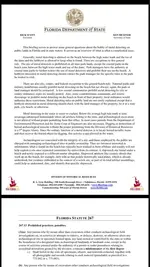 image-744392021.webp59.8 KB · Views: 227
image-744392021.webp59.8 KB · Views: 227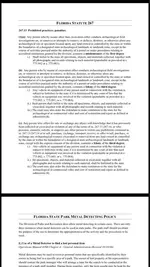 image-2057035259.webp57.2 KB · Views: 172
image-2057035259.webp57.2 KB · Views: 172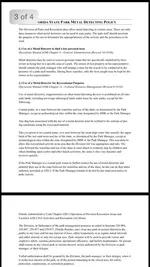 image-276263886.webp49.6 KB · Views: 161
image-276263886.webp49.6 KB · Views: 161 image-2028924329.webp34.3 KB · Views: 173
image-2028924329.webp34.3 KB · Views: 173 image-2638153407.webp37.2 KB · Views: 172
image-2638153407.webp37.2 KB · Views: 172 image-2058605160.webp51.8 KB · Views: 167
image-2058605160.webp51.8 KB · Views: 167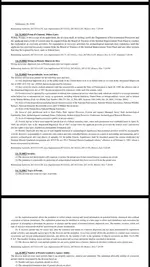 image-899456524.webp51.2 KB · Views: 160
image-899456524.webp51.2 KB · Views: 160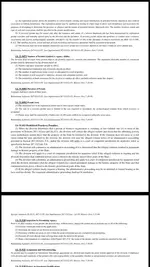 image-1992864286.webp49.3 KB · Views: 152
image-1992864286.webp49.3 KB · Views: 152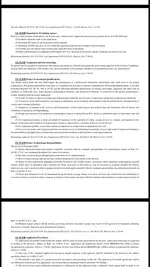 image-3808474720.webp49.4 KB · Views: 157
image-3808474720.webp49.4 KB · Views: 157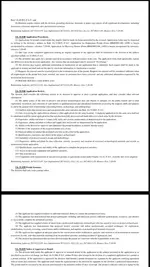 image-3080800479.webp51.5 KB · Views: 157
image-3080800479.webp51.5 KB · Views: 157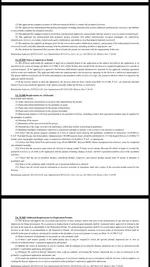 image-1482684980.webp51 KB · Views: 151
image-1482684980.webp51 KB · Views: 151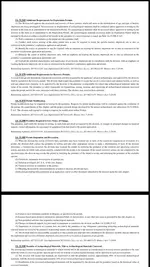 image-3115969125.webp54.3 KB · Views: 157
image-3115969125.webp54.3 KB · Views: 157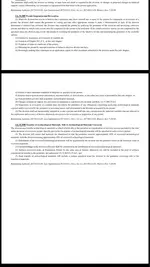 image-59196822.webp32.1 KB · Views: 167
image-59196822.webp32.1 KB · Views: 167


